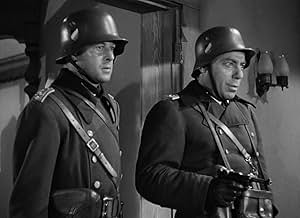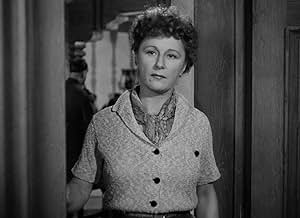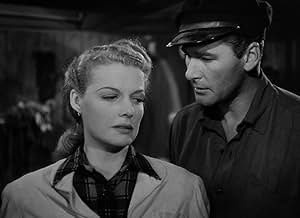After two years under German rule, a small Norwegian fishing village rises up and revolts against the occupying Nazis.After two years under German rule, a small Norwegian fishing village rises up and revolts against the occupying Nazis.After two years under German rule, a small Norwegian fishing village rises up and revolts against the occupying Nazis.
- German Lieutenant
- (uncredited)
- Townsman
- (uncredited)
- Petersen
- (uncredited)
- Maj. Ruck
- (uncredited)
- Director
- Writers
- All cast & crew
- Production, box office & more at IMDbPro
Featured reviews
There was a popular sub-genre of war picture during the war years that centered on common European folk rising up against Nazi occupiers. This is one of the best that I've seen, although the propaganda nature of the storytelling keeps it from being truly great. Another minor weakness lies in Flynn's character, a rather bland cipher with little to distinguish him. Flynn apparently felt the same himself and tried to get out of the movie, but in the end it turned out to be a quality picture on his resume. Sheridan is good, if a bit too made up for a Norwegian villager in her situation. I also liked Nancy Coleman as a Polish gal at the end of her rope, and Judith Anderson as a rather severe woman whose secretly in love with one of the occupying soldiers. The movie's explosive climax seems light years away from director Milestone's work 13 years previously on what is arguably the greatest anti-war film, All Quiet On the Western Front.
However, this movie is a cut above other propaganda movies. The cast is excellent, top-notch all the way: Errol Flynn, Ann Sheridan, Walter Huston, Ruth Gordon, John Beal, Helmut Dantine, Judith Anderson and Morris Carnovsky.
Sometimes on the IMDb message board, a poster will ask for opinions on the best ensemble cast ever assembled. This one deserves a mention.
It's probably not at the top of everyone's list because it was released while Errol Flynn was fighting statutory rape charges, which was a distraction to audiences, certainly, and also because it followed "Casablanca."
Norway was dragged into the World War II conflict because Hitler was very concerned about protecting the Norwegian shoreline so that the Russians could not receive supplies if they joined the Allies.
In the story, the village is being occupied by the Nazis, who are taking the people's shipments of basic necessities and oppressing the entire town by their very presence - curfews, patrols, and the commandeering of the local hotel as their base.
Flynn plays the head of the resistance, a brave fisherman named Gunnar Brogge. He is joined in the fight byand by other villagers and by the woman he loves, Karen Stensgard (Sheridan). Her father (Huston) is a doctor who, like many others, has been content not to make waves; his wife (Gordon) longs for the days before the war when the family was together.
Karen, however, has no such wish - her brother, Johann (John Beal) is a weakling who collaborated with the Nazis in Oslo. Hearing that he's returning home, she warns the resistance group that he could cause problems. Meanwhile, the group waits to receive a shipment of arms so that they can fight effectively.
The director, Lewis Milestone, has created an atmosphere where one feels the oppression, fear and frustration of these simple people. There are powerful scenes that demonstrate the viciousness of the Nazis, led by Helmut Dantine.
One scene is off-camera - the rape of Karen. As another poster here commented, she of course looks fabulous when she returns to the group - some dirt smudges and her beautiful hair falling around her face. That is really the one false note in this story of great bravery.
The entire cast is terrific, led by Flynn, who demonstrates quiet strength and determination as Gunnar. This is really an ensemble piece, however, and Flynn and Sheridan do not overwhelm the production.
Walter Huston again demonstrates his brilliant acting skills as a man trying to stick it out without having a high profile, and Gordon is sympathetic as his wife, who yearns for the family moments that are now gone. All of the roles, including the smaller ones, are essayed beautifully.
I am sure that this film was very inspirational when first seen, particularly the radio message from Roosevelt at the end of the movie. "Edge of Darkness" is a compelling story about the effect of the war and occupation on the average person.
In the case of Norway, it's simply the long Norwegian coastline. Even before the Soviet Union was invaded, Hitler saw the necessity of preventing supplies from getting to the Soviets should they break the Hitler-Stalin pact and enter the war on the allied side. The convoy route used was the one into the Arctic Ocean into Archangel and Murmansk. No other route was possible for American lend lease. The Nazis operated bases from Norway and sank a lot of allied shipping in the North Atlantic.
So this is why this small village and so many others like it were occupied and why the country was invaded. The Norwegian people from the king and queen on down, knew their country was in a sideshow theater, yet they did resist as best they could.
In fact Mr. Churchill did mount a counterattack in Norway, but the invasion failed and British troops had to withdraw. From time to time he brought up freeing Norway during allied conferences, but could get no support for it from Roosevelt or Stalin.
Errol Flynn stars in Edge of Darkness and the usual Flynn derring-do is kept on hold. Probably in keeping with the stoical nature of Scandinavian character. He's not exactly Captain Blood in this one. He's a fisherman, but his natural qualities of leadership come through as he leads the resistance.
Edge of Darkness is the story of one coastal Norwegian village who put up with Nazi occupation beyond what was humanly bearable. The rape of Ann Sheridan finally touches off a revolt.
It's not a star vehicle per se. Errol Flynn and Ann Sheridan have a great deal less dialog than they would in most films. Edge of Darkness is a study of the various townspeople and the way each one of them deals with the Nazi occupation.
Walter Huston and Ruth Gordon are the parents of Sheridan and John Beal. Huston is the town doctor and tries to remain above the battle. Gordon, like Patricia Collinge in The Little Foxes, retreats into nostalgia. Sheridan is a resistance member and Beal was an informer in Oslo, but only the immediate family know it at first.
However the performance I like the best is Charles Dingle's. Dingle has always been one of my favorite character players ever. He's Gordon's brother, the owner of the cannery, and he quite deliberately chooses to collaborate with the Germans. He's the kind of villain you love to hate as is Helmut Dantine the commanding officer of the Nazi garrison.
We learn Dingle's fate at the beginning of the film and as the action unfolds in flashback the audience really rejoices in that fate.
No mistake about it, Edge of Darkness is a World War II propaganda film, but still entertaining today
Did you know
- TriviaAccording to the book "The Films of World War II" by Joe Morella, Edward Z. Epstein and John Griggs, the production was beset by many problems. The book states, "Ann Sheridan parted from husband George Brent; Errol Flynn was indicted for rape; location shooting in a small California town was delayed several weeks because of fog, during which Ruth Gordon and Judith Anderson were besieged with telegrams from Katharine Cornell demanding their return to New York for her stage production of 'The Three Sisters'. Miss Gordon was restrained from leaving, but not before letting it be known that she hated Hollywood and the picture. Fortunately for Warners, the fog lifted, Flynn was acquitted, and the film was completed."
- GoofsAfter Gunnar (Errol Flynn) says to Karen (Ann Sheridan), "When my father was my age, he already had two children", there's an obvious jump cut indicating some dialogue had been deleted; this likely was due to a failure to gain acceptance by the Production Code censors.
- Quotes
Captain Hauptmann Koenig: What do you want?
Sixtus Andresen: I... thought it only right, considering that you are... de facto commandant of the village, to acquaint you with a decision that I've made.
Captain Hauptmann Koenig: I'm very busy.
Sixtus Andresen: I know. I hope you'll forgive me. I know I'm being selfish. But, uhh... Why did you want my house?
Captain Hauptmann Koenig: For a block house! But what was it you wanted to see me about?
Sixtus Andresen: I cannot let you have my house.
Captain Hauptmann Koenig: You what?
Sixtus Andresen: I must forbid you to enter my house.
Captain Hauptmann Koenig: [laughs hysterically] Are you insane? I could have you shot!
Sixtus Andresen: I know. But if you're interested, I'll tell you what brought me to my conclusion, which is, I can assure you, completely unshakeable. You see, I am well past seventy, and at my age it would be foolish for me to be like Socrates' enemies, and fear death more than I love truth.
Captain Hauptmann Koenig: Go on!
Sixtus Andresen: ...I have no guns, no airplanes, no force. I disdain.
Captain Hauptmann Koenig: SILENCE!
Sixtus Andresen: What you don't understand is that the individual man...
Captain Hauptmann Koenig: QUIET, YOU FOOL!
Sixtus Andresen: - The individual man must stand against you like a rock.
Captain Hauptmann Koenig: [shaking Andresen] Will you STOP!
Sixtus Andresen: [calmly] No. If I were afraid, there might be hope for you, but I am not.
[Koenig slaps Andresen across the face]
Sixtus Andresen: There are certain things you cannot take away from me... What is mine, is mine. Do you think you can stop the working of my brain and my heart?
[slap]
Sixtus Andresen: We are not animals; we are men.
[slap]
Sixtus Andresen: That is the foundation of law - you cannot win.
[slap]
Sixtus Andresen: Where are your courts?
[slap]
Sixtus Andresen: Your judges?
[slap]
Sixtus Andresen: And your juries?
[slap]
Sixtus Andresen: Until you bring them forward, I must forbid you my house.
Captain Hauptmann Koenig: HE 'FORBIDS'!
[knocks the old man down the stairwell]
- ConnectionsEdited into The Extraordinary Seaman (1969)
- SoundtracksA Mighty Fortress is Our God (Ein' Feste Burg)
(uncredited)
Traditional German hymn
Lyrics by Martin Luther (1535)
English translation by Frederick H. Hedge (1853)
Played and sung offscreen by an unidentified chorus during the opening credits, in the church,
and at the end
Variations in the score throughout
- How long is Edge of Darkness?Powered by Alexa
Details
Box office
- Budget
- $1,653,000 (estimated)
- Runtime1 hour 59 minutes
- Color
- Aspect ratio
- 1.37 : 1
Contribute to this page






































